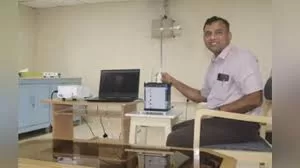Researchers at the Indian Institute of Technology (IIT) Madras have made a breakthrough in sports medicine with the development of an indigenous and portable Point-of-Care-Ultrasound (POCUS) scanner. Powered by Artificial Intelligence (AI), this novel device enables real-time diagnosis of sports injuries directly on the field, offering immediate insight into the extent of an injury. This capability allows medical professionals to make informed decisions on whether an injured athlete can continue playing or requires urgent medical attention.
The POCUS scanner is designed with safety in mind, using ultrasound technology that involves no radiation exposure while providing high-resolution imaging for effective diagnosis. With its wide range of applications in sports medicine, this device stands out as an essential tool for assessing musculoskeletal injuries swiftly, potentially revolutionizing how athletes receive care during training and competitions.
Professor Arun K. Thittai from the Department of Applied Mechanics and Biomedical Engineering, who led the development, highlighted the importance of such a device. “We observed a current technological gap and a need for a point-of-care device for injury management and rehabilitation of elite athletes within routine training premises. A quick assessment for musculoskeletal injuries on the field will help sports players get immediate attention and focus on recovery,” he said.
The AI-powered POCUS system represents a significant step forward in extending ultrasound technology beyond traditional hospital settings, making it a versatile tool for sports professionals. The IIT Madras team is now focused on commercializing this innovation, particularly for musculoskeletal (MSK) imaging.
“We are currently exploring all options to take up POCUS for MSK imaging for commercial translation,” Prof. Thittai added. He is also a faculty member at the Center of Excellence in Sports Science and Analytics (CESSA) at IIT Madras, which is playing a key role in this innovation.
Founded in 2019 under the Institute of Eminence initiative, CESSA aims to become a global leader in sports technology, offering cutting-edge products and solutions to enhance athlete performance. The center also caters to general fitness and health consumers, promoting advancements in sports science.
The IIT Madras team plans to complete the prototype of the POCUS scanner by 2024. Following its development, the scanner will undergo testing and pilot data collection in coordination with various sports authorities, ensuring it meets the needs of athletes and medical professionals alike.
This AI-powered POCUS scanner is expected to significantly impact sports injury management by providing real-time, on-the-field assessments that prioritize athlete safety and recovery.












